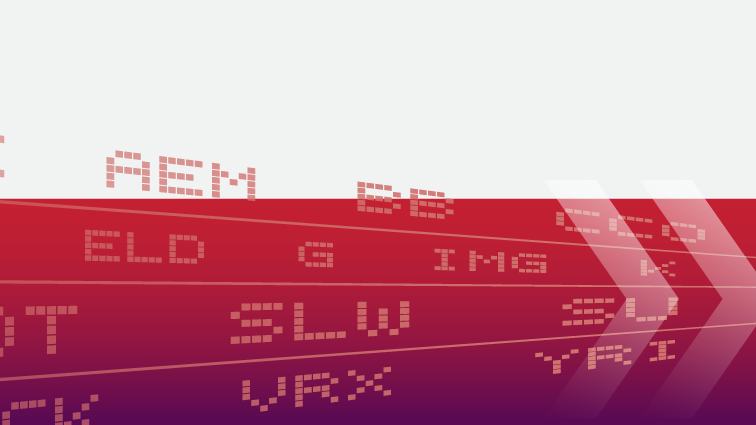Option Strategies when you lack Conviction

Will markets ever get beyond political headlines and other self-inflicted emergencies? Without conviction, we will continue to see directionless markets propelled by emotions.
So far we have escaped mass hysteria, which explains why there have been no sustained spikes in volatility. Clearly traders’ lack of conviction has more to do with complacency than fear, which means that options are relatively inexpensive. Low cost options open the door to limited risk directional trades like stock replacement strategies.
Stock replacement is not a leveraged strategy which is typically associated with buying calls. Instead, it is a strategy that can be used when you lack conviction and want to mitigate risk. The idea is to buy calls rather than the underlying stock and use the remainder of the money to purchase a fixed income security. The long call plus fixed income will act like a convertible debenture, with the call providing equity exposure and the bond being the defensive component.
To put some meat on this skeleton, let’s examine a stock replacement using Bank of Montreal (Symbol: BMO, Friday’s close: $69.83). While BMO has turned in some decent numbers through the first ten months of 2011 – +14.1% YTD (ex-dividends) – future growth will hinge on how well the economy recovers, and whether the bank is motivated to lend.
Like all banks, BMO is contending with enormous regulatory oversight and have been reluctant to lend to anyone without a pristine credit rating and ample collateral. Consequently, Canadian banks are sitting on a pile of reserves that could be put to work as the economy strengthens. More if US politicians can get beyond the impasse that has gripped Washington for the past two years.
There are two ways to look at this. The bullish scenario posits that Feds tapering will bump up rates, expand net interest margins and reduce loan loss reserves leading to a surge in profitability.
The bears would argue that banks will not engage in higher risk loans until they have 1) a buy-in from regulators and 2) comfort that a riskier loan will not find its way onto its’ loan loss reserves.
Both scenarios are plausible and are, to some extent, dependent on political appeasement. What better reason to engage in risk reduction strategies.
With a stock replacement strategy example, the goal is to use calls as an alternative to buying BMO outright. Suppose you were interested in buying 500 shares of BMO at $69.83 for a total commitment of $34,915. Instead consider buying 5 BMO January (2015) 70 call at $4.00 or better per share. The calls will cost $2,000 and you would then use the remainder of the capital (i.e. the difference between the cost of 500 shares and the cost of 5 calls) to purchase a fixed income security that would mature in January 2015.
President, CIO & Portfolio Manager
Croft Financial Group
Richard Croft has been in the securities business since 1975. Since February 1993, Mr. Croft has been licensed as an investment counselor/portfolio manager, operating under the corporate name R. N. Croft Financial Group Inc. Richard has written extensively on utilizing individual stocks, mutual funds and exchangetraded funds within a portfolio model. His work includes nine books and thousands of articles and commentaries for Canada’s largest media channels. In 1998, Richard co‐developed three FPX Indexes geared to average Canadian investors for the National Post. In 2004, he extended that concept to include three RealWorld portfolio indexes, which demonstrate the performance of the FPX portfolio indexes adjusted for real-world costs. He also developed two option writing indexes for the Montreal Exchange, and developed the FundLine methodology, which is a graphic interpretation of portfolio diversification. Richard has also developed a Manager Value Added Index for rating the performance of fund managers on a risk adjusted basis relative to a benchmark. And In 1999, he co-developed a portfolio management system for Charles Schwab Canada. As global portfolio manager who focuses on risk-adjusted performance. Richard believes that performance is not just about return, it is about how that return was achieved.
The information provided on this website, including financial and economic data, quotes and any analysis or interpretation thereof, is provided solely for information purposes and shall not be construed in any jurisdiction as providing any advice or recommendation with respect to the purchase or sale of any derivative instrument, underlying security or any other financial instrument or as providing legal, accounting, tax, financial or investment advice. Bourse de Montréal Inc. recommends that you consult your own advisors in accordance with your needs before making decision to take into account your particular investment objectives, financial situation and individual needs.
All references on this website to specifications, rules and obligations concerning a product are subject to the rules, policies and procedures of Bourse de Montréal Inc. and its clearinghouse, the Canadian Derivatives Clearing Corporation, which prevail over the content of this website. Although care has been taken in the preparation of the documents published on this website, Bourse de Montréal Inc. and/or its affiliates do not guarantee the accuracy or completeness of the information published on this website and reserve the right to amend or review, at any time and without prior notice, the content of these documents. Neither Bourse de Montréal Inc. nor any of its affiliates, directors, officers, employees or agents shall be liable for any damages, losses or costs incurred as a result of any errors or omissions on this website or of the use of or reliance upon any information appearing on this website.
BAX®, CADC®, CGB®, CGF®, CGZ®, LGB®, MX®, OBX®, OGB®, OIS-MX®, ONX®, SCF®, SXA®, SXB®, SXF®, SXH®, SXM®, SXO®, SXY®, and USX® are registered trademarks of the Bourse. OBW™, OBY™, OBZ™, SXK™, SXJ™, SXU™, SXV™, Montréal Exchange and the Montréal Exchange logo are trademarks of the Bourse. All other trademarks used are the property of their respective owners.
© 2024 Bourse de Montréal Inc. All Rights Reserved.
